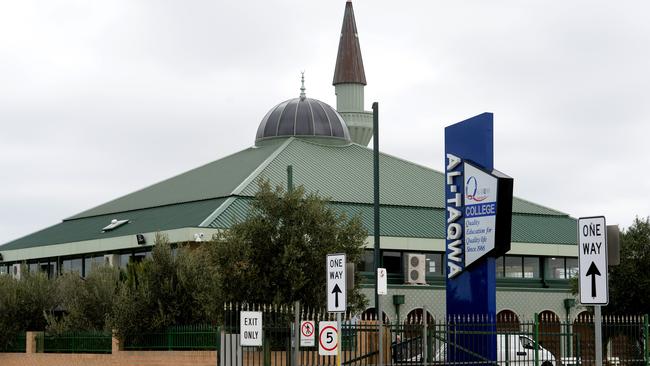Coronavirus: cluster Al-Taqwa College operates like club
The Islamic college at the centre of one of Victoria’s largest coronavirus clusters operates under an informal governance structure.

The Islamic college at the centre of one of Victoria’s largest coronavirus clusters operates under an informal governance structure typically employed by small sporting clubs and preschools, and is run by a veteran educator who serves as both principal and chairman of the board.
Omar Hallak founded Al-Taqwa College in 1986 as a primary school with just 25 students and it has grown to be one of the largest schools in Melbourne’s west, educating more than 2100 students from prep to Year 12.
The independent school, which receives in excess of $25m a year in state and federal funding, is closed in the wake of an outbreak of COVID-19, which has infected 142 staff, students and community contacts.
It is unclear whether the virus was transmitted within the school or in the wider community given one of the staff members to test positive advised the health department they had also attended an extended family gathering with a COVID-19-positive person. It has since emerged several students reside at the public housing towers that were locked down.
However, staff, parents and students remain in the dark over when, or if, the campus will reopen after the entire community was asked to quarantine on July 3.
Both Mr Hallak and deputy principal Mohammad Hallak, understood to be Mr Hallak’s son, declined to comment on Monday, asking that questions be emailed to the school. Hussam Hallak, the school’s property manager and another son, also declined to comment.
According to Al-Taqwa’s website, annual reports and information lodged with the Australian Charities and Not-for-profits Commission, Omar Hallak has ultimate control over both the operation of the school and its governance. He serves as principal and chairman of the board.
While there is no regulatory requirement for the role of principal and chairman to be kept separate, advice from Independent Schools Victoria, of which Al-Taqwa is a member, states an “essential aspect of good governance” is that “clear boundaries” exist between the overall governance of the school, which is the responsibility of the board, and day-to-day management, which is the responsibility of the principal and senior management team. A question posed on ISV’s website asks: “The principal runs the school and the board. Is this good governance?”
“No,” is the response. “It is a vital aspect of good governance that the management and governance of the school be separated. If the principal runs the board then there is no desirable forum to discuss the principal’s performance. Board members will tend to feel intimidated and this will hinder honesty, transparency and accountability.”
The Australian is not suggesting Mr Hallak, senior staff or board members are involved in wrongdoing or that there is any conflict of interest, only that the governance arrangement is not typical for a large, established school.
Experienced company director Miriam Silva, who played a key role reforming governance at the once-troubled Malek Fahd Islamic School in Sydney, said there were instances where a school might opt to have a dual principal-chairman role, “but I’m not a fan of it”. “Personally, I would say that in schools you do need that extra oversight from someone else who is independent,” she said. “It’s even more important in a crisis situation.”
While most independent schools are registered as companies limited by guarantee under the Corporations Act 2001, Al-Taqwa’s governing body, The Islamic Schools of Victoria (Werribee College) Incorporated, has been established under the Associations Incorporations Reform Act (Vic) 2012 and the Australian Charities and Not-for-profits Commission Act 2012.
According to ISV, setting up as an incorporated association is a simple and less expensive alternative to corporate registration, “primarily intended for use by sporting clubs and other similar non-profit organisations and may, possibly, be suitable for small schools or kindergartens”.
According to the school’s most recent financial accounts, it received $27.8m in state and federal government grants in 2018 and a further $5.9m in fees and levies.
Despite this, the school reported a working capital deficiency of $4m due to its current liabilities outweighing liquid assets.
Mr Hallak declined to answer questions and did not respond to emails seeking comment.
A Victorian Department of Education spokesman said for a non-government school to receive state funding “it must meet registration standards set out by the Victorian government”.



To join the conversation, please log in. Don't have an account? Register
Join the conversation, you are commenting as Logout